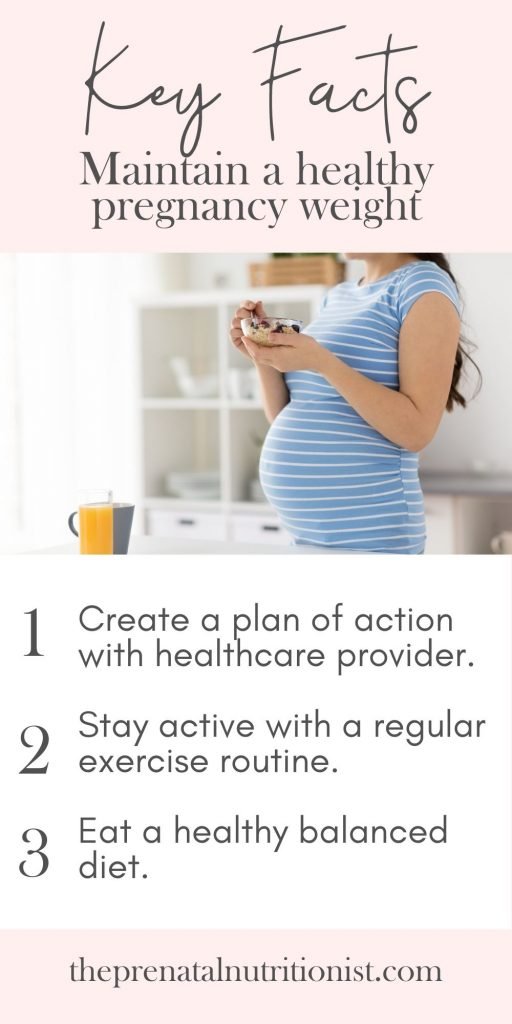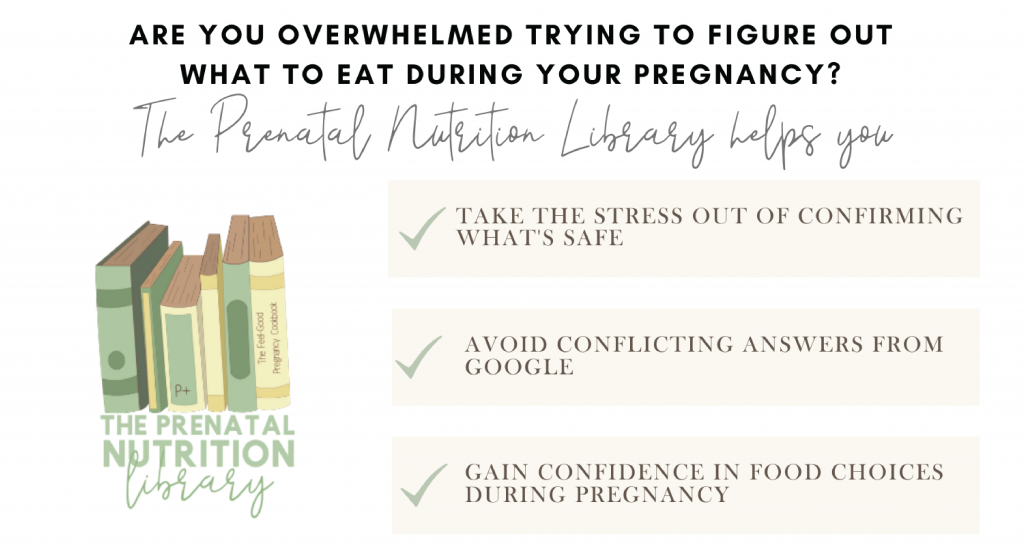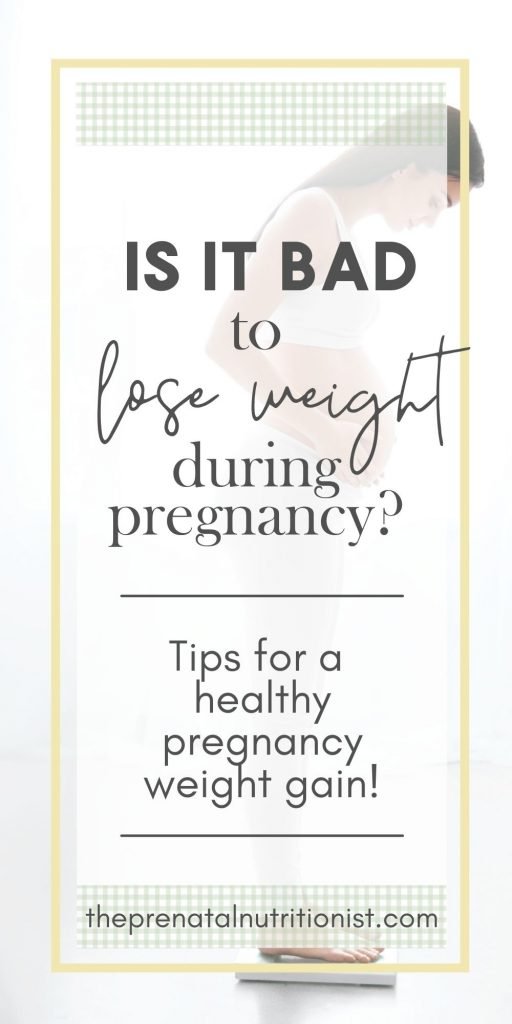
Pregnant people go through so many physical changes from the very beginning of fetal development. Weight gain during pregnancy is inevitable, for most. There is a baby literally growing inside of you. So of course this will cause expectant mothers to gain weight.
The weight of the baby adds to this situation as well as the natural breast growth due to the body storing more fat in preparation for breast milk. There is the presence of extra fluids in the body both for the placenta and the amniotic fluid, and additional blood volume. There is a lot going on which makes you realize how incredible pregnancy is!
Although it is normal to gain weight during pregnancy, it’s ideal to maintain a healthy body weight before pregnancy and gain an appropriate amount for you throughout. In fact, the American College of Obstetrics and Gynecology indicates that it is best for women to reach a healthy weight before getting pregnant. Since those who are overweight often face more complications during fetal development.
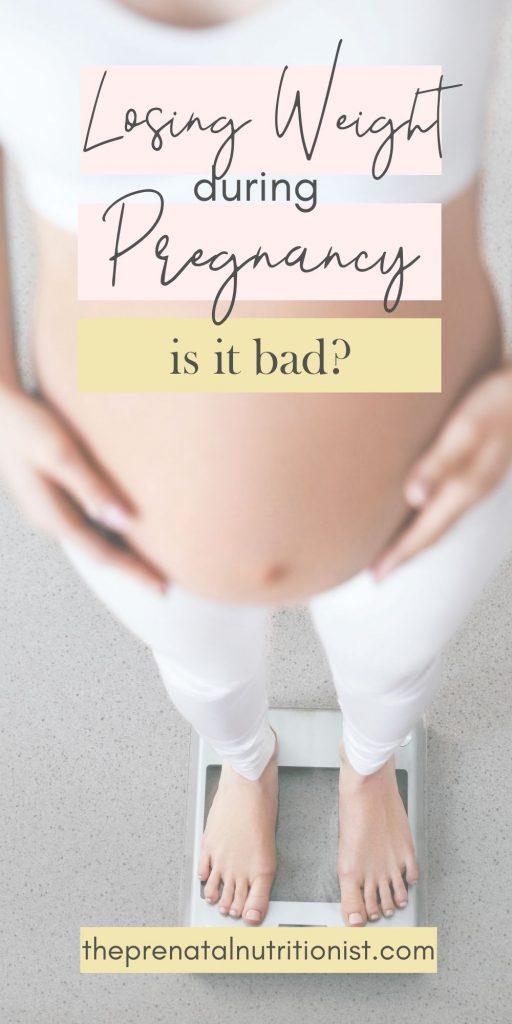
Is It Bad To Lose Weight During Pregnancy
Perhaps losing weight during pregnancy might not seem like a very common occurrence, but it can definitely happen although usually doesn’t harm your baby. A pregnant woman can lose weight during pregnancy thanks to a few reasons like morning sickness, loss of appetite, and food aversions, especially during early pregnancy. Weight loss may also happen as a result of making better food choices or cutting out alcohol and fast food once you find out you’re pregnant. However, most of the weight loss during pregnancy usually occurs in the first trimester. And weight gain typically evens out by the end of pregnancy before baby is born.
This is often when the mother might not even be aware that she is pregnant, too. Still, maintaining a healthy weight is key to the safety of your growing baby. Especially if you are trying to conceive. Even if you feel unhappy with your weight, weight loss should not actively be pursued during this stage of life.
That being said, if your weight drops significantly, talk to a professional healthcare provider to address any issues as soon as possible.
You might have hyperemesis gravidarum (HG). One indicator of HG, extreme nausea and vomiting in pregnancy, is weight loss > 5% of your pre-pregnancy weight. Other indicators include persistent vomiting, constant nausea, loss of appetite, and dehydration. You might want to receive a medical review from a healthcare professional if you are suffering from these symptoms.
If you are looking to learn more about weight loss during pregnancy and how to keep a healthy weight, this article will help clear out your doubts on the subject. Keep reading to find out more about gaining, maintaining, or losing weight while pregnant!
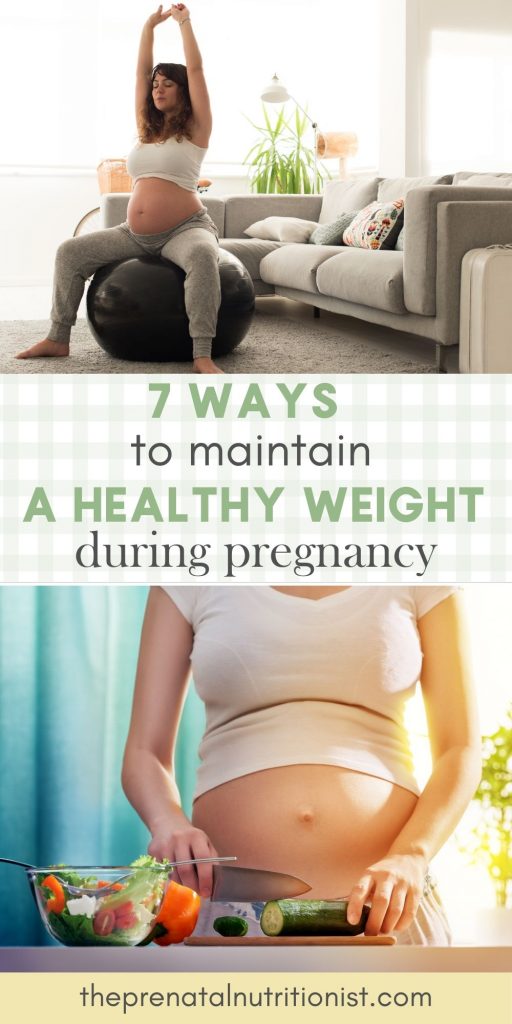
How To Maintain A Healthy Pregnancy Weight
Understand how much weight you should gain during pregnancy.
The Institute of Medicine guidelines suggest the more you weigh prior to pregnancy the fewer pounds you should gain during pregnancy. Although not a perfect tool, body mass index (BMI) is used as a standardized tool in medical practice and for research purposes.
BMI is also the sole indicator for which weight gain “bracket” you fall into as far as weight gain recommendations during pregnancy, i.e. if your BMI is between 18.5 and 24.9, the recommendation is to gain 25-35 pounds total during pregnancy. This will vary if your BMI is in a different range, for example if you have a BMI of 30.
These guidelines are in fact just guidelines and it is important not to over stress yourself about hitting these numbers exactly, after-all stress can lead to overeating and mental exhaustion (we don’t need anymore of that while growing a human!). Focusing on meeting your nutrient needs and ensuring the baby is developing properly are much more important than the number on the scale or body fat.
Check with your ob-gyn and a registered dietitian (RD) for the optimal plan of action if you are concerned about your weight.
If your body mass index indicates that you fall into the overweight or obese categories, talk to your doctor and RD to see if they might recommend you to lose weight before getting pregnant. They can also help you identify an appropriate weight gain goal for you during pregnancy.
Nutrition will play a big role in not only how much weight you gain during pregnancy. But how you FEEL during pregnancy. While we know pregnancy comes with its aches and pains, you can absolutely feel like your regular self by taking proactive steps.
Maintain a regular exercise routine during pregnancy.
Lucky for you, being pregnant does not necessarily mean you have to give up your workout routine! Unless specifically told otherwise by your obstetrician, it’s safe for you to take part in physical activity. However, please be sure to take all of the necessary precautions. And double check what you are used to doing is still safe.
Exercising three to five times a week will help you keep a healthy weight during your pregnancy. As a baseline, you should always drink plenty of water before and after working out. Attire is also very important. So make sure to wear an appropriate sports bra and other clothing items to prevent becoming overheated. You should always avoid contact sports. You can check the ACOG site to read more on the subject of exercise during pregnancy.
Eat a healthy pregnancy diet.
That’s why we’re here! A nutritious eating regimen is crucial to maintaining a healthy weight during pregnancy. The most important tip to practice is to focus on including nutrient-dense foods majority of the time.
Make sure you are eating enough from all of the food groups, i.e. protein, fruits, vegetables, whole grains, and fats. Following a diet with a ton of restrictions is not recommended during pregnancy as this could hamper your nutrient intake.
As an important side note, remember to always practice food safety to avoid food poisoning, toxoplasmosis, and other conditions. It’s also a good habit to start planning your meals in advance! You want to keep your body fueled to maintain your energy and strength. Plus, this will help you to keep healthy snacks at hand for when the pregnancy cravings hit.
Don’t eat for two during pregnancy.
Seriously, eating for two is a huge myth! Although different for everyone, pregnant women typically don’t need to consume any extra calories during the first trimester. During the second, you may need to increase your calories from anywhere between 200 to 300 calories, and in the final stages, you may need up to 450 more calories, but again, this is individualized.
More important than calories is focusing on your hunger and fullness cues, you should do your best to eat to satiety (fullness), and eat when you feel hungry (trying not to wait until that “hangry” feeling kicks in).
We like to consider your new eating style “nourishment for two” versus “eating for two.” Your nutrient needs do increase, but they certainly don’t double. As you can see, there is no real need to eat two bowls of pasta every night if you are not feeling like it. It might be a good idea to consider adding a prenatal vitamin to your diet.
Plus, things like nausea could occur after eating large meals when you are pregnant and or heartburn, which can be especially unpleasant. Sticking with appropriate portions and or splitting your meals into 6 smaller ones throughout the day instead of 3 large ones is also a good tip for pregnant people!
Curb the pregnancy cravings with nutrient-dense alternatives.
A cup of Ben and Jerry’s once a week won’t do irreparable damage, but it’s important to avoid eating pizza and ice cream every night if you want to have a healthy, feel-good pregnancy! Maybe you are craving a chocolate donut. Why don’t you try to make a homemade version of it instead?
Even the simplest of swaps can make a huge difference such as using whole wheat flour, making oatmeal cookies instead of regular ones, and changing sugar for dates. A pint of raspberries can be just as delicious as a pack of berry gummies. And, they have way more health benefits than the latter.
Another good fruit to eat during pregnancy are strawberries! They’re packed with antioxidants, folate, and filled with water. So, not only are these delicious little guys helping you curb your sweet cravings, they’re also hydrating you as well! It’s a win win!
When you should speak to a doctor
If you think the amount of weight you are losing or gaining during pregnancy is in any way unusual, don’t hesitate speaking with your ob-gyn. It’s better to clear all doubts right off the bat and speak to a professional healthcare provider to get on the right track and receive a plan made just for you.
Do you feel confident about maintaining a healthy weight during pregnancy?
I hope this post cleared your doubts regarding losing weight while pregnant and how to keep a healthy lifestyle, and healthy weight during pregnancy! It’s very important for pregnant women to monitor their weight, eat a nutritious diet, and talk to a doctor or healthcare professional if any concerns arise. By following these practical tips, you are keeping both you and your baby safe. And that’s what matters the most to lose weight safely!
If you’re looking to take the guesswork out of eating during pregnancy or topics such as gestational diabetes, we got you covered! The Prenatal Nutrition Library contains expert crafted menus for each stage of your pregnancy journey – you won’t even have to think about it.
